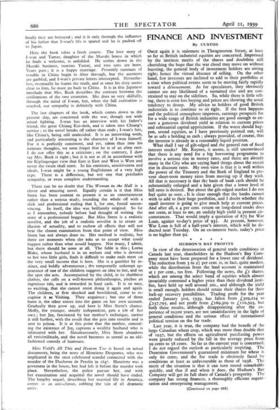* * * *
HUDSON'S BAY PROFITS
In view of the deterioration of general trade conditions in Canada last year, shareholders in the Hudson's Bay Com- pany must have been prepared for a lower rate of dividend. The reduction from 3 to 2-1 per cent. is, in fact, quite modest, while the distribution from the land account is maintained at I per cent., tax free. Following the news, the i shares, which are among the select band of equities which almost invariably command a higher price than their dividend justi- fies have held up well around 20S., and although the yield is ;mall enough, holders should retain their shares for their lock-up recovery possibilities. Trading profit for the year. ended January 31st, 1939, has fallen from £309,224 to £237,795, and net profit from £169,309 to £110,503, but both these results, although disappointing after the ex- perience of recent years, are not unsatisfactory in the light of general conditions and the serious effect of international political tension on the fur trade.
Last year, it is true, the company had the benefit of the large Canadian wheat crop, which was more than double that of 1937, but the effects on agricultural purchasing power were greatly reduced by the fall in the average price from 99 cents to 58 cents. So far as the current year is concerned, I do not regard the outlook as particularly inspiring. The Dominion Government's guaranteed minimum for wheat is only 6o cents, and the fur trade is obviously faced by conditions at least as unfavourable as those of 1938. The merit of the situation is that it can turn round remarkably quickly, and that if and when it does, the Hudson's Bay Company will get its full share of Canada's prosperity. The company has strong finances, a thoroughly efficient organi- sation and enterprising management.
(Continued on page 688)










































 Previous page
Previous page